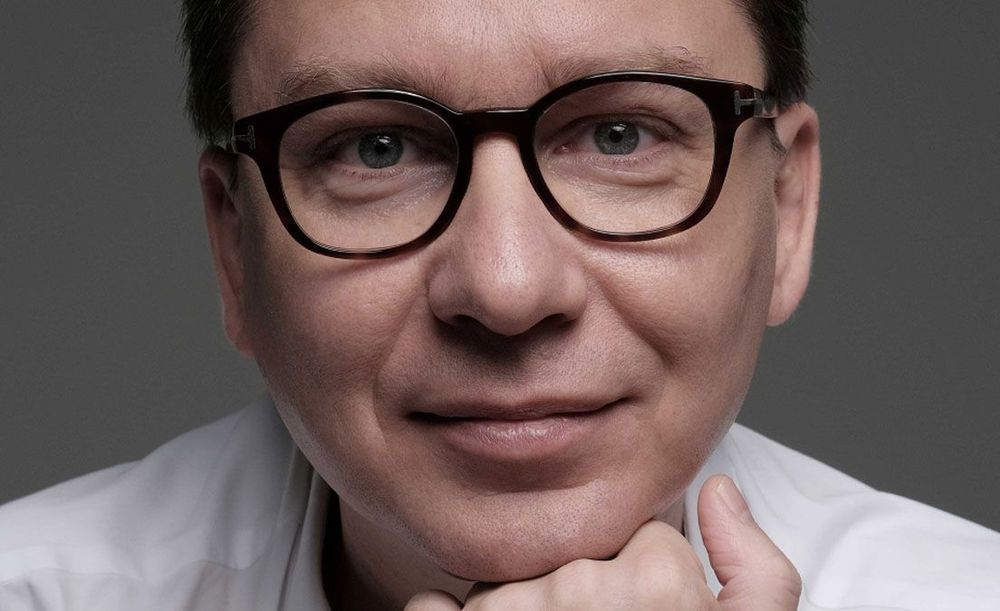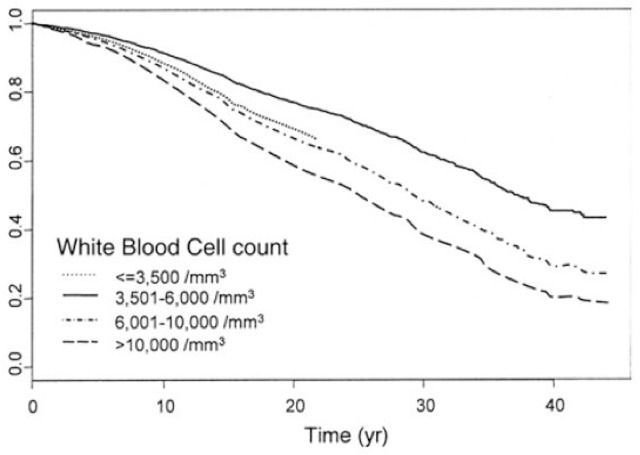As the longevity investor’s new fund turns 8 months old this month, we went five for five with Sergey Young.



Circulating levels of white blood cells (WBCs) are one of the 10 variables used to quantify biological age with PhenoAge (https://michaellustgarten.com/2019/09/09/quantifying-biological-age). The reference range for WBCs is 4.5 – 11 *109 cells/L, but within that range, what’s optimal?
Several studies have reported that WBCs greater than 5 are associated with an increased all-cause mortality risk (Ahmadi-Abhari et al. 2013, Samet et al. 2005, Weijenberg et al. 1996). While observational studies are important for identifying associations with mortality risk, stronger evidence is obtained when the data from the same subjects are tracked for a time period. Perhaps the best evidence for the association between WBCs with mortality risk comes from the Baltimore Longitudinal Study on Aging (BLSA), which studied 2803 men and women over a period of 44 years (Ruggiero et al. 2007). As shown below, subjects that had circulating WBCs between 3.5 – 6 had the best survival, whereas WBCs below 3.5, between 6 – 10, and 10+ each had successively higher risk. The 0.5 point on the y-axis of the curve (survival) is defined as 50% mortality, and is the point where half of the study subjects died, whereas the remaining 50% were still alive.
Do you really want to live forever?
My mission is to drastically improve your life by helping you break bad habits, build and keep new healthy habits to make you the best version of yourself. I read the books and do all the research and share my findings with you!
This video is “Day 0” of RAADFest 2019 in Las Vegas. I discuss various topics and will do my best at RAADFest to interview longevity experts like Bill Faloon, James Strole, Bernadeane, Liz Parrish, Dr. Aubrey de Grey, Dr. Bill Andrews, Dr. Ed Park, Dr. Duncan Ross, Ben Goertzel and hopefully many more. I’ll bring you all the major updates from RAADFest!
I’ll be sharing daily RAADFest Roundups this week on my YouTube channel.
Aim: Aging in humans is associated with a 10–40-fold greater incidence of sudden cardiac death from malignant tachyarrhythmia. We have reported that thiol oxidation of ryanodine receptors (RyR2s) by mitochondria-derived reactive oxygen species (mito-ROS) contributes to defective Ca2+ homeostasis in cardiomyocytes (CMs) from aging rabbit hearts. However, mechanisms responsible for the increase in mito-ROS in the aging heart remain poorly understood. Here we test the hypothesis that age-associated decrease in autophagy is a major contributor to enhanced mito-ROS production and thereby pro-arrhythmic disturbances in Ca2+ homeostasis.
Methods and Results: Ventricular tissues from aged rabbits displayed significant downregulation of proteins involved in mitochondrial autophagy compared with tissues from young controls. Blocking autophagy with chloroquine increased total ROS production in primary rabbit CMs and mito-ROS production in HL-1 CMs. Furthermore, chloroquine treatment of HL-1 cells depolarized mitochondrial membrane potential (Δψm) to 50% that of controls. Blocking autophagy significantly increased oxidation of RyR2, resulting in enhanced propensity to pro-arrhythmic spontaneous Ca2+ release under β-adrenergic stimulation. Aberrant Ca2+ release was abolished by treatment with the mito-ROS scavenger mito-TEMPO. Importantly, the autophagy enhancer Torin1 and ATG7 overexpression reduced the rate of mito-ROS production and restored both Δψm and defective Ca2+ handling in CMs derived from aged rabbit hearts.
Conclusion: Decreased autophagy is a major cause of increased mito-ROS production in the aging heart. Our data suggest that promoting autophagy may reduce pathologic mito-ROS during normal aging and reduce pro-arrhythmic spontaneous Ca2+ release via oxidized RyR2s.
Back in January, we were joined by Dr. Aubrey de Grey, Dr. Amutha Boominathan, Dr. Matthew O’Conner, and Michael Rae from the SENS Research Foundation for a webinar discussion panel focused on MitoSENS, the mitochondrial repair program. During the webinar, a number of points were discussed, and the Lifespan Heroes in the audience got to ask the researchers questions about MitoSENS and about the work of the SENS Foundation in general.
In 2015, the MitoSENS team raised funding on Lifespan.io to launch a study testing if they could create mitochondrial DNA copies in the cell nucleus, and they were successful in doing so as a result of the funds they received. In October 2019, the MitoSENS team launched a new follow-up project called MitoMouse, which aims to bring its mitochondrial repair therapy to mammals as a proof of concept on the road to translation to human use.

Modern research and technology have completed the quest of Juan Ponce de Leon. We have found the fountain of youth. Instead of some remote island, it is everywhere around us in the food that we eat and the beverages we drink. A variety of edibles have been indicated above. They all contain the youth restoring chemical known as NAD+. Including them in your diet is one of the best health decisions you can make today.
I’m excited to share I did an interview on transhumanism with Skyy John of Tipsy Bartender. He’s an actor and one the most famous people in the alcohol business!
We are about to live FOREVER because of new advances in technology and artificial intelligence! I sat down with futurist and transhumanist Zoltan Istvan as he explains how all of this will happen.
FIND ZOLTAN
Get a FREE copy of Zoltan’s new book: https://amzn.to/2LTg8lX
Tweets by zoltan_istvan
https://www.instagram.com/zoltan_istvan/
ROB ROY RECIPE:
2 oz. (60ml) Scotch
3⁄4 oz. (22ml) Sweet Vermouth
3 dashes Angostura Bitters
BUY TIPSY BARTENDER GEAR:
https://bit.ly/2KMjF50 Dr. David Sinclair Join Dr. Mercola to discuss longevity and his new book “Lifespan”.
Subscribe for the latest health news: https://articles.mercola.com/subscribe.aspx
Visit our website: https://www.mercola.com
Listen to our podcasts: https://www.mercola.com/downloads/podcast.htm
Find us on Social Media
Facebook: https://www.facebook.com/doctor.health
MeWe: https://mewe.com/p-front/dr.josephmercola
Instagram: https://www.instagram.com/drmercola
Twitter: https://twitter.com/mercola

GenSight Biologics has recently released data showing the effectiveness of GS010, the company’s gene therapy for Leber Hereditary Optic Neuropathy (LHON), a mitochondrial disease that can lead to blindness. Like in previous studies, this therapy had a bilateral effect.
Gene Therapy
In LHON, the mitochondrial protein ND4 is poorly expressed through mitochondrial DNA (mtDNA). GS010 is a gene therapy that causes this protein to be allotropically expressed in the nucleus, after which it is shuttled to the mitochondria through messenger RNA. This makes GS010 a partial treatment for mitochondrial dysfunction, which is one of the hallmarks of aging.

Klotho, named after one of the Fates of Greek mythology, is the queen of anti-aging proteins. There are no close contenders at this time. Klotho gene therapy, like the one offered by Integrated Health Systems, has tremendous benefits. While it is produced primarily in the kidneys and brain, its soluble form circulates throughout the body. Many of the investigations so far have been done nephrologists interested in its prominent role in Chronic Kidney Disease (CKD), yet over the last decade its multifaceted role in the aging process has become a topic of intense research.
Klotho deficient mice show premature aging in multiple organs.
Inducing KL overexpression with a viral vector, like AAV, not only reverses this premature aging, but also enhances resistance to oxidative and ischemic damage. More impressive, KL outright extends the lifespans of mice, likely be inhibiting IGF and insulin signalling. Dubbed an “aging suppressor gene,” it can yield results similar to caloric restriction – what is, at this time, the most tried and true method of extending the lifespans of a variety of model organisms.